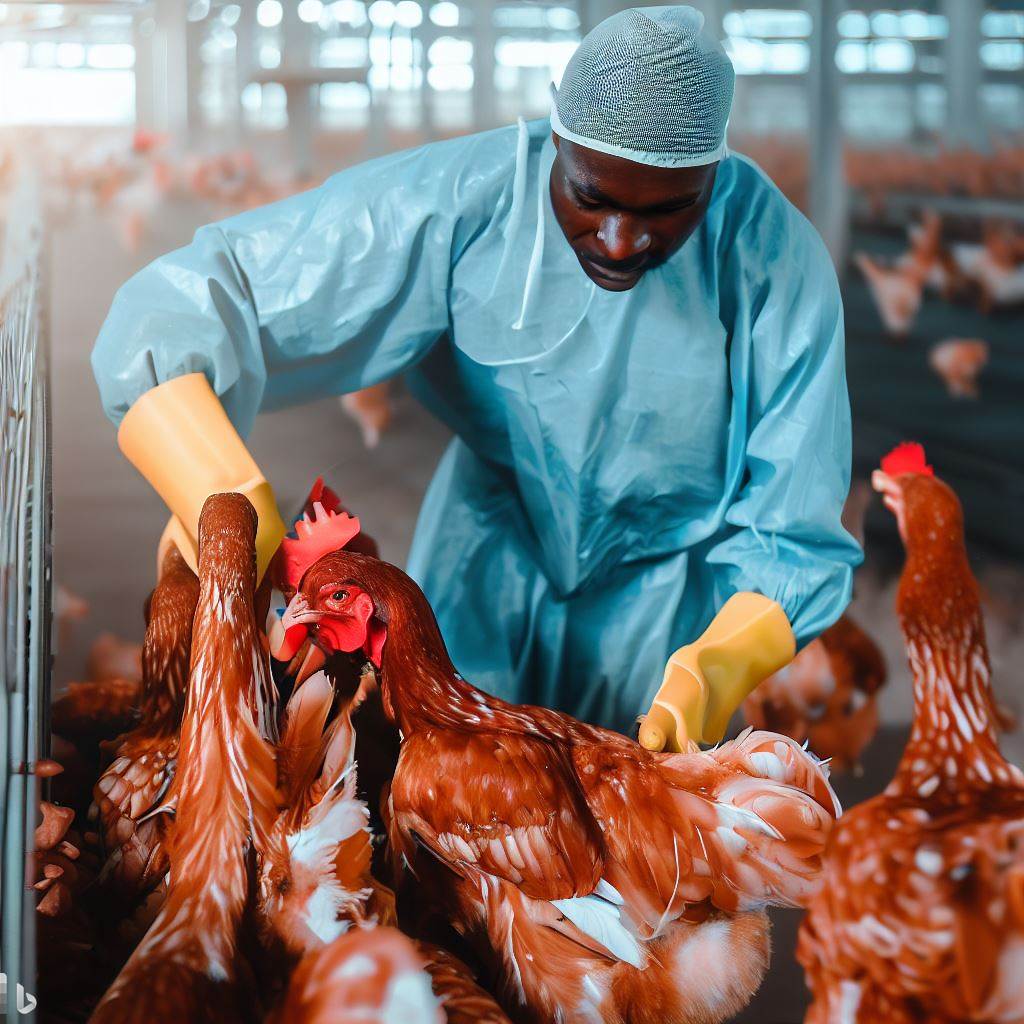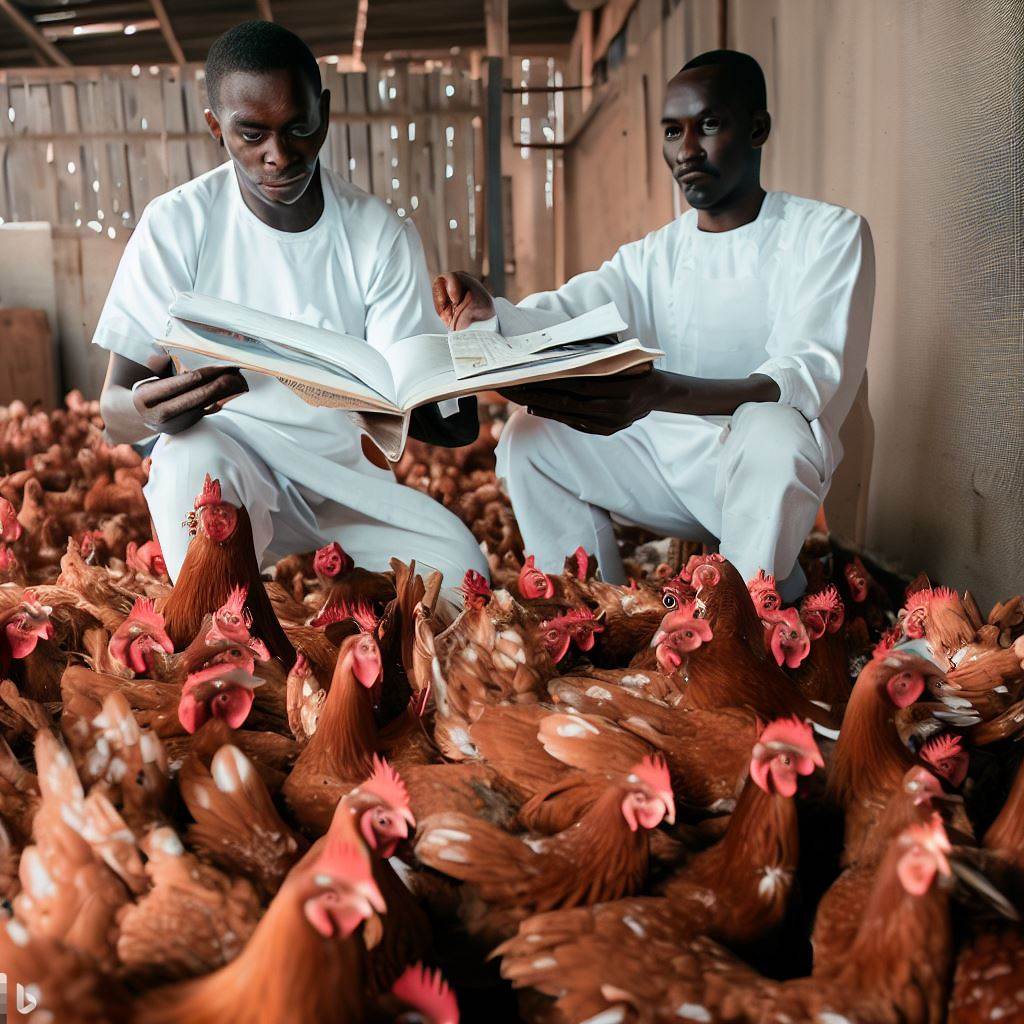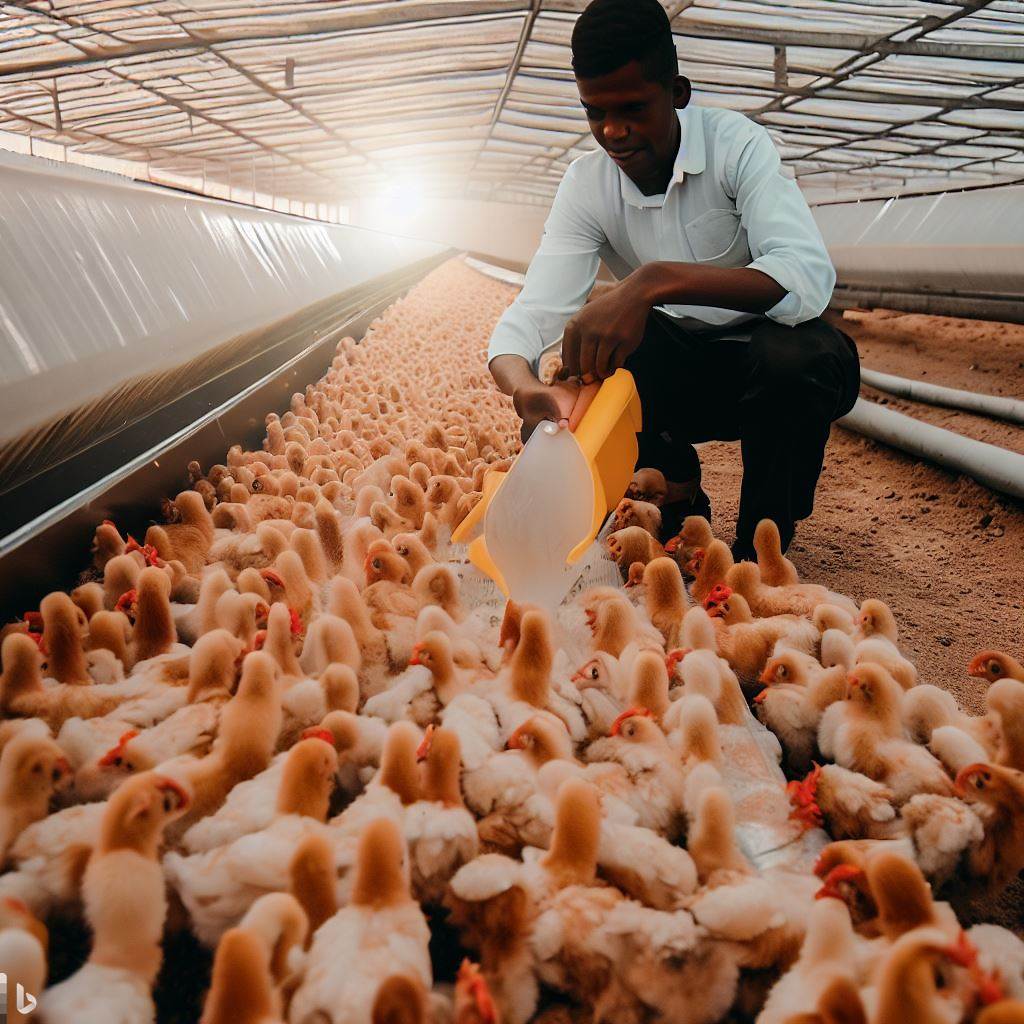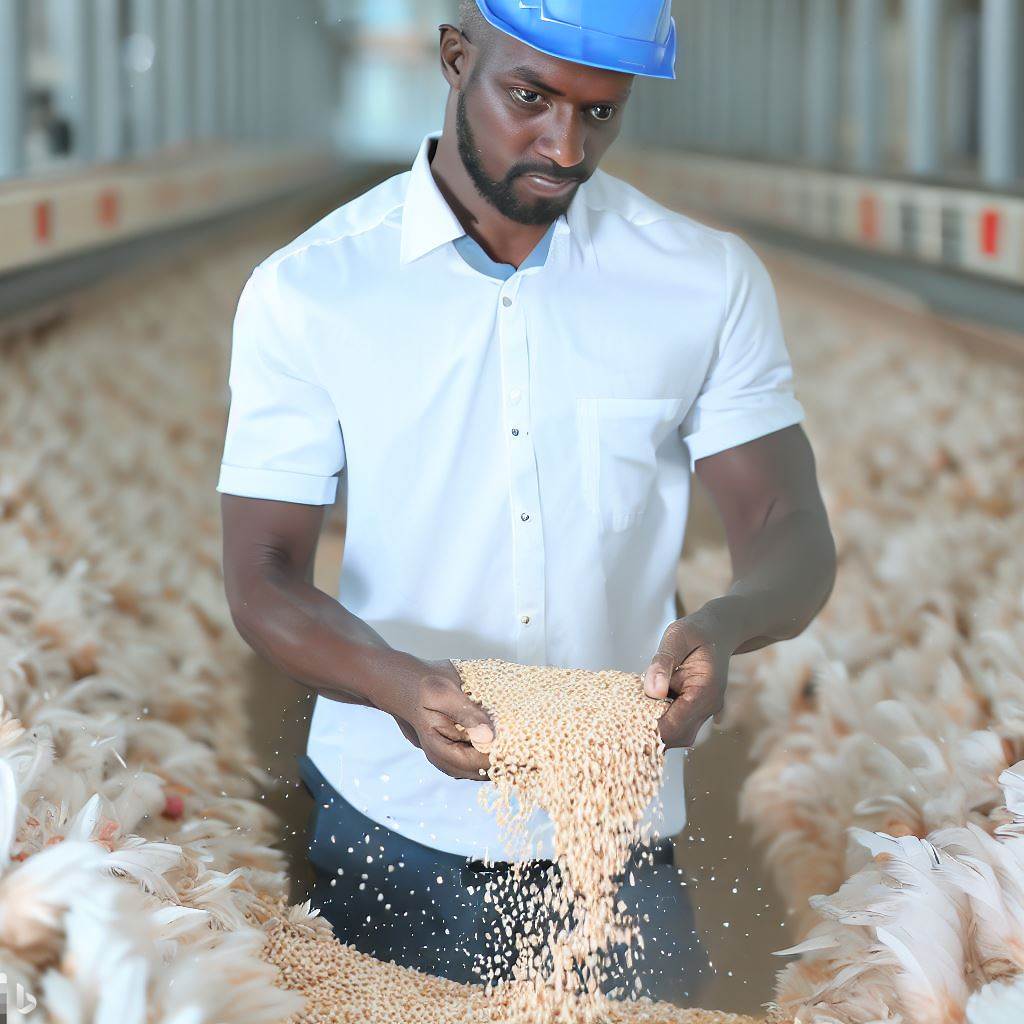Introduction
A. Definition of government policies
Government policies refer to the rules, regulations, and actions implemented by the government to achieve specific objectives.
B. Brief overview of poultry production in Nigeria
Poultry production in Nigeria is a vital sector that involves rearing birds for meat and egg production.
C. Importance of studying the impact of government policies on poultry production in Nigeria
1. Economic significance
Understanding the impact of government policies on poultry production helps in assessing their influence on the economy, including job creation, income generation, and foreign exchange earnings.
2. Social impact
Policies affect poultry farmers, workers, and consumers, influencing their livelihoods, food security, nutrition, and health.
3. Environmental implications
Government policies impact the sustainability of poultry production, addressing issues like waste management, pollution control, and natural resource conservation.
The impact of government policies on poultry production in Nigeria cannot be underestimated.
These policies shape the trajectory of the industry, affecting its economic, social, and environmental aspects.
By studying their impact, we gain insights into how these policies can be optimized to promote sustainable growth, address challenges, and maximize benefits for all stakeholders.
In the upcoming blog sections, we will explore the specific government policies and their consequences on poultry production in Nigeria, shedding light on the key drivers and potential solutions for a thriving industry.
Join us as we delve into this crucial topic.
Historical Context of Government Policies on Poultry Production in Nigeria
A. Overview of past government policies in Nigeria related to agriculture and poultry production
The Nigerian government has implemented various policies over the years to promote agriculture and poultry production.
These policies aimed to boost food security, create employment opportunities, and increase revenue generation.
Government interventions included financial support, tax incentives, and the establishment of agricultural development programs.
B. Evaluation of the impact of previous policies on poultry production
Success stories
Some government policies led to significant growth in poultry production.
For instance, the Agricultural Transformation Agenda implemented in 2013 encouraged private sector investments.
Transform Your Career in Nigeria
Discover unmatched expertise with our personalized Career Consulting service. Navigate Nigeria’s job market with a strategy tailored just for you.
Get StartedIt resulted in increased production, improved breeding techniques, and the availability of quality poultry products.
Challenges faced
Despite success stories, certain challenges hindered the impact of government policies on poultry production.
Inadequate infrastructure, such as storage and transportation facilities, affected the supply chain.
Disease outbreaks, high cost of inputs, and limited access to credit also posed challenges to poultry farmers.
C. Lessons learned from historical policies
The evaluation of previous government policies provides valuable lessons for future interventions.
Targeted investments
Government policies should focus on improving critical areas such as infrastructure, disease control measures, and research and development.
Strategic investments will address existing challenges and create a conducive environment for poultry production.
Stakeholder engagement
It is essential to involve all stakeholders, including farmers, industry experts, and policymakers, in policy formulation.
Their collaboration ensures that policies are practical, effective, and responsive to the needs of poultry producers.
Emphasizing value chain development
Policies should prioritize the development of the poultry value chain.
This includes supporting the production of quality inputs, improving processing and packaging facilities, and promoting market access for producers.
Capacity building and technology transfer
Investing in training programs and technology transfer initiatives is crucial for building the capacity of poultry farmers.
Skills development and access to modern farming techniques will enhance productivity and competitiveness in the sector.
Continuity and consistency
To achieve long-term impact, government policies on poultry production must exhibit continuity and consistency.
Frequent changes in policies can disrupt the sector and discourage investments.
In fact, the historical context of government policies on poultry production in Nigeria highlights both successes and challenges.
Lessons learned from previous policies should guide future interventions to ensure sustainable growth and development in the sector.
By targeting investments, involving stakeholders, emphasizing value chain development, and promoting capacity building and technology transfer, the Nigerian government can support the poultry industry and enhance food security.
Current Government Policies Affecting Poultry Production in Nigeria
A. Overview of the current policies specifically targeting poultry production
The Nigerian government has implemented several policies to support and regulate the poultry production industry.
The policies aim to address the challenges faced by poultry farmers and promote the growth of the sector.
These policies include provisions for improved production techniques, disease control measures, market accessibility, and environmental sustainability.
B. Analysis of the goals and objectives of these policies
The goals of the policies are to enhance poultry production, increase productivity, and improve the overall health and safety standards.
By implementing these policies, the government aims to ensure food security, create employment opportunities, and boost economic growth.
Publish Your Professional Profile, Business or Brand
Showcase your expertise, gain trust, and boost visibility instantly on Professions.ng.
Publish NowThe objectives include establishing a favorable business environment, promoting research and development, and facilitating technological advancements in the sector.
C. Discussion on the potential impacts on various aspects of poultry production
Production and productivity
The implementation of improved production techniques and disease control measures can significantly enhance poultry production and increase productivity.
Poultry farmers will have access to better breeding practices, efficient feed management systems, and advanced veterinary care to maximize production output.
Health and safety regulations
The government policies will enhance the health and safety standards in the poultry industry by imposing strict regulations.
Farmers will be required to follow hygiene protocols, implement biosecurity measures, and receive regular inspections to prevent the outbreak of diseases and ensure consumer safety.
Market accessibility and competition
The policies aim to improve market access for poultry farmers by developing robust distribution networks and eliminating trade barriers.
Enhanced competition will encourage farmers to improve the quality of their products, resulting in better consumer choices and fair pricing.
Technological advancements
The government policies promote research and development initiatives to facilitate technological advancements in the poultry sector.
Innovative technologies such as automated poultry farms, smart monitoring systems, and efficient waste management solutions will enhance production efficiency and profitability.
Environmental sustainability
The policies emphasize the adoption of eco-friendly practices in poultry production to mitigate environmental impacts.
Farmers will be encouraged to implement waste management systems, reduce water and energy consumption, and minimize pollution to ensure sustainable production methods.
In short, the current government policies play a crucial role in shaping the poultry production landscape in Nigeria.
These policies promote sustainable growth, increased productivity, and improved health and safety standards.
By investing in technological advancements and addressing market accessibility, the government aims to boost the overall development of the poultry industry in Nigeria.
Read: A Day in the Life of a Nigerian Poultry Farmer
Case Studies on the Impact of Government Policies on Poultry Production in Nigeria
Examination of specific examples where government policies have directly influenced poultry production
- The introduction of import restrictions on poultry products led to increased local production.
- Government subsidies for poultry farmers resulted in the establishment of more poultry farms.
- Implementation of biosecurity measures by the government helped in preventing the spread of diseases in poultry farms.
- Government support in providing training and technical assistance improved the skills and knowledge of poultry farmers.
- The ban on the use of antibiotics in poultry farming led to the adoption of alternative disease prevention strategies.
Evaluation of success stories and challenges faced in these case studies
- Success stories: Increased employment opportunities in the poultry sector due to expansion of farms.
- Success stories: Reduction in poultry diseases and improvement in the quality of poultry products.
- Challenges faced: Inadequate funding and resources for the implementation of government policies.
- Challenges faced: Lack of proper enforcement of regulations by government agencies.
- Challenges faced: Limited access to credit and financial support for small-scale poultry farmers.
Lessons and insights gained from the case studies
- Government policies play a crucial role in shaping the growth and development of the poultry industry.
- Strategic implementation and monitoring of policies are essential for desired outcomes.
- Collaboration between government agencies, farmers, and stakeholders is necessary for policy success.
- Policy formulation should consider the unique needs and challenges faced by different poultry farmers.
- Continuous evaluation and adjustment of policies are vital to address emerging issues in the industry.
In fact, government policies have had a significant impact on poultry production in Nigeria. Specific examples have shown how these policies directly influenced various aspects of the industry.
Success stories and challenges have been evaluated, providing valuable insights for future policy development.
The case studies highlight the importance of effective implementation, adequate funding, and collaboration between stakeholders.
Lessons learned from these studies can be used to improve the formulation and implementation of policies for the sustained growth of the poultry sector in Nigeria.
Read: Insider Tips for Profitable Poultry Farming in Nigeria

Stakeholders’ Perspectives
A. Analysis of the opinions and views of poultry farmers, industry experts, and policy-makers
- Poultry farmers play a crucial role in the production of poultry in Nigeria.
- They provide employment opportunities and contribute to the nation’s economy.
- Poultry farmers generally believe that government policies have a significant impact on their production.
- They express concerns about the inconsistency and unpredictability of policies, which affect their planning and investments.
- Moreover, farmers are often frustrated by the lack of support and access to credit facilities from the government.
- Industry experts are essential stakeholders who analyze and provide insight into poultry production.
- They acknowledge the influence of government policies on the industry’s success.
- Experts emphasize the need for policies that promote sustainable practices and encourage technological advancements.
- These professionals advocate for collaboration between the government and industry players to develop effective policies.
- Policy-makers, as stakeholders, have the responsibility to formulate and implement government policies.
- They face the challenge of balancing the interests of farmers, consumers, and the economy as a whole.
- Policy-makers recognize the need for policies that ensure food safety and affordability for consumers.
- They aim to strike a balance between protecting local farmers and fostering competition through trade policies.
B. Identification of common concerns and viewpoints
- Poultry farmers, industry experts, and policy-makers all recognize the importance of government policies.
- They agree that stable and consistent policies are essential for the growth and development of the poultry sector.
- The stakeholders understand the need for policies that prioritize food safety and quality.
- They also agree on the importance of access to credit facilities and support for poultry farmers.
- All stakeholders acknowledge that technological advancements are crucial for improving productivity and efficiency.
- Policy-makers, industry experts, and farmers agree that collaboration is necessary for policy formulation and implementation.
- The stakeholders share concerns about the negative impact of inconsistent policies on planning and investment.
C. Potential conflicts and areas of agreement among stakeholders
- Conflicts may arise between policy-makers and farmers regarding the implementation of certain policies.
- Farmers may feel that some policies prioritize large-scale producers over small-scale farmers.
- However, stakeholders can find common ground in the pursuit of policies that promote sustainable practices.
- Collaboration between policy-makers and industry experts can bridge the gap between different perspectives.
- While conflicts may arise, the stakeholders agree that the ultimate goal is to create an enabling environment for poultry production.
- There is a consensus that policies should protect local farmers while fostering healthy competition in the industry.
- Stakeholders also agree on the importance of continuous research and development to stimulate growth and innovation.
All in all, the perspectives of poultry farmers, industry experts, and policy-makers provide valuable insights into the impact of government policies on poultry production in Nigeria.
While there may be disagreements and potential conflicts, stakeholders recognize the significance of stable and supportive policies for the sector’s growth.
Collaboration and dialogue between these stakeholders are crucial for formulating effective policies that address common concerns and promote sustainable development.
Read: Understanding the Market Demand for Poultry in Nigeria
Potential Ways to Improve Government Policies for Poultry Production in Nigeria
Identification of gaps and shortcomings in current policies
- Insufficient support for small-scale poultry farmers.
- Lack of effective regulations to control disease outbreaks and prevent zoonotic diseases.
- Inadequate infrastructure and access to veterinary services in rural areas.
- Limited funding and resources for research and development in the poultry sector.
Recommendations for policy adjustments or enhancements
- Allocate more financial resources to support small-scale poultry farmers in accessing quality inputs and technology.
- Strengthen disease surveillance systems and enforce strict regulations to prevent and control outbreaks.
- Invest in the development of veterinary infrastructure and improve access to veterinary services in rural areas.
- Increase funding for research and development to enhance innovation and improve poultry production practices.
Discussion on potential benefits of policy improvements
- Increased production and productivity
- Enhanced market opportunities
- Better health and safety standards
- Strengthened environmental sustainability practices
Read: Health and Safety Standards in Nigeria’s Poultry Industry
Conclusion
The profound influence of government policies on poultry production cannot be overstated. The analysis conducted has revealed significant insights that warrant attention.
Firstly, a recapitulation of the pivotal role government policies play in shaping the landscape of poultry production underscores their far-reaching impact.
These policies have the potential to drive innovation, enhance biosecurity, and ensure sustainable practices across the industry.
Secondly, the summary of key findings emphasizes the interconnected nature of regulatory frameworks and their implications for production efficiency, animal welfare, and market competitiveness.
The intricate balance required demands informed and targeted approaches.
Consequently, a resounding call to action is extended to policymakers, industry stakeholders, and farmers alike.
Collaboration emerges as the linchpin for forging effective policy strategies.
The imperative lies in fostering a comprehensive dialogue that leverages expertise and experience to craft policies aligned with both economic realities and ethical standards.
In essence, the intricate web of poultry production is intricately woven with government policies.
The impact of these policies radiates throughout the sector, underscoring their role as catalysts for transformative change.
As we move forward, a united effort is needed to navigate the complexities and capitalize on the opportunities embedded in policy-making for a sustainable and thriving poultry industry.




